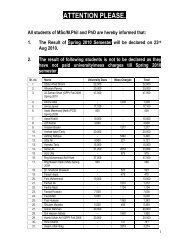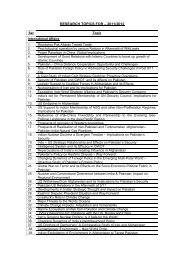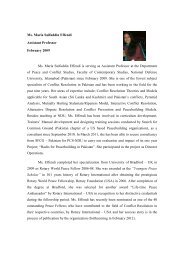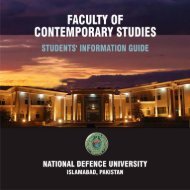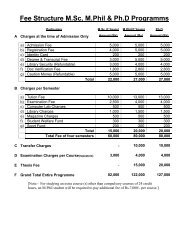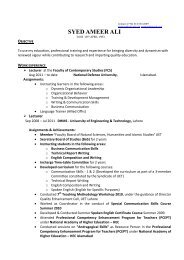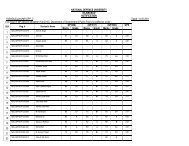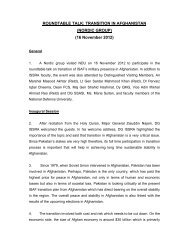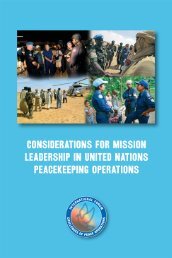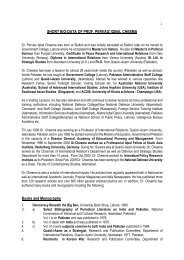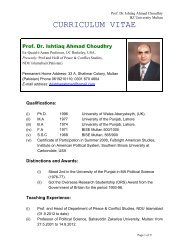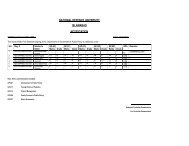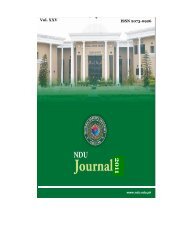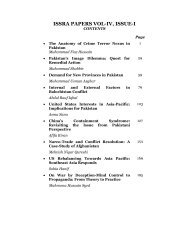OPINION Vol.1, No.1 June 2013 - National Defence University
OPINION Vol.1, No.1 June 2013 - National Defence University
OPINION Vol.1, No.1 June 2013 - National Defence University
Create successful ePaper yourself
Turn your PDF publications into a flip-book with our unique Google optimized e-Paper software.
GLOBALIZATION – OPPORTUNITIES AND CHALLENGES FOR PAKISTAN<br />
Introduction<br />
Mankind is in a constant process of evolution. Through the ages, world-order has changed from<br />
one form to the other. While the Industrial age was still a veritable phenomenon, mankind was exposed<br />
to yet another revolutionary change which was a by-product of industrialization, i.e. globalization.<br />
Globalization is the integration of the world's economies, cultures, people, goods, knowledge, services<br />
and infrastructures, through transnational investments and rapid proliferation of communication. It<br />
connects individuals, communities, businesses and governments around the world through business of<br />
influential Multinational Corporations (MNCs). Jet airplanes, cheap telephone services, computers,<br />
internets, shipping and rapid capital flows have made the world more interdependent and interconnected,<br />
virtually transforming the world into a global village. The phenomenon of globalization has created a<br />
dichotomy in perceptions dividing the world in to a plethora of apprehensions and appreciations due to<br />
challenges and opportunities it offers. With the advent of globalization, a sense of euphoria prevailed<br />
since its proponents professed that the misery to human life had come to an end since globalization was<br />
about shared prosperity. Its critics however argue that the vision of shared fortune of reduced violence<br />
and equality amongst nations appears to be a far-cry and that human misery has actually increased. It<br />
then leaves us with the question as to whether the concept has been applied in a misconstrued manner or<br />
this was another ploy of the wealthy and powerful to thrive on the resources of the under-developed<br />
countries – a question not yet answered.<br />
The region that we are in has peculiar socio-economic and security dynamics. There is immense<br />
trade potential at the regional and global level which can turn the fortune of South Asian countries.<br />
Pakistan sits at the confluence of East and West, which gives it a unique opportunity to act as a trade link<br />
between many countries. But broadly speaking, the two largest countries of South Asia have a legacy of<br />
animosity and mistrust which precludes any bold economic initiative by either side. These are the<br />
challenges which Pakistan is facing today and which must be met with realistic approach to reap the<br />
benefits of globalization. Therefore, there is a need to analyze the phenomenon of globalization and its<br />
implications for Pakistan with a view to suggesting measures to address the challenges and exploit the<br />
opportunities.<br />
Phenomenon of Globalization – A Holistic View<br />
The term “globalization” has been defined by many informed scholars, groups and organizations.<br />
Merriam Webster defines it as, “Development of an increasingly integrated global economy marked by<br />
free trade, free flow of capital and the tapping of cheaper foreign labour markets.” 1 IMF refers to<br />
globalization as, “The growing economic interdependence of countries worldwide through the increasing<br />
volume and variety of cross-border transactions in goods and services and of international capital flows,<br />
and also through more rapid and widespread diffusion of technology.” 2<br />
Evolution of Globalization<br />
For thousands of years people have been trading goods and travelling across great distances. The<br />
overland Silk Road that connected Asia, Africa and Europe is a good example of the transformative<br />
power of international exchange. Philosophies, religions, language, arts and other aspects of culture<br />
spread and mixed, as nations exchanged products and ideas. In the 15 th and 16 th centuries, Europeans<br />
made important discoveries in their exploration of the World Oceans.<br />
The great German statesman of 19 th century Chancellor Otto Von Bismarck once said “If there is<br />
to be revolution, it is better that we should make it rather than to be its victims” 3 .The Islamic golden age<br />
added another stage of globalization, when Jewish and Muslim traders and explorers established trade<br />
routes, resulting in globalization of agriculture, trade, knowledge and technology. The advent of the<br />
Mongol Empire, also facilitated travel along the Silk Road. The modern age of globalization started with<br />
the Industrial Revolution at the end of the 18 th century. In the Early 19 th century, the development of new<br />
forms of transportation and telecommunications that compressed time and space, allowed for<br />
increasingly rapid rates of global interchange. In the 20 th century, road and air links made transportation<br />
faster, and the advent of electronic communications connected billions of people, setting a stage for IT<br />
revolution in 21 st Century. 4<br />
After the Second World War the victorious nations during Bretton Woods Conference agreed to<br />
collectively manage the world economy through control of effective international institutions. This led to<br />
<strong>OPINION</strong> <strong>Vol.1</strong> <strong>No.1</strong> 66 <strong>June</strong> <strong>2013</strong>



